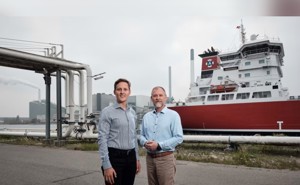Historic SAF delivery arrives in Copenhagen – growing demand in Danish aviation
To meet growing demand for SAF from airlines, DCC & Shell Aviation Denmark are now, for the first time in Denmark, establishing a large inventory of bio-based aviation fuel, SAF. On 10th September, a tanker delivered a record quantity of SAF to a tank at Oiltanking Copenhagen’s terminal at Prøvestenen, which will now be their starting point for stable supplies to the players in the Danish aviation market.
By establishing a first large-scale SAF storage on Danish soil, DCC & Shell Aviation is taking another step to meet the growing demand for non-fossil aviation fuel*.
Well before 2025, when new EU requirements start mandating airlines to fly with an increasing proportion of SAF, the Danish aviation industry is already moving ahead on its own initiative. This has created a surge in interest and demand for SAF – something that is now paving the way for the establishment of a large, land-based SAF storage in Denmark.
“For a couple of years, we have been considering establishing an actual Danish supply base for SAF on a large scale. From 2021, when we initiated the first cooperation with Sønderborg Airport for SAF supplies for the domestic route to Copenhagen, things have progressed rapidly. Since then, Billund Airport has joined and most recently Copenhagen Airport via the SAF agreement we have entered into with Air Greenland,” Sune Petersen, Head of Sustainability & Strategy at DCC & Shell Aviation Denmark, explains.
Therefore, together with Oiltanking Copenhagen, who own the terminal at Prøvestenen, another step is now being taken in the efforts to strengthen the infrastructure and supply of SAF to the Danish market.
“From Oiltanking Copenhagen’s tanks at Prøvestenen, we are not only able to send SAF directly into the pipelines to Copenhagen Airport. We can also efficiently reach the other airports through our existing supply network. This will facilitate the availability of SAF for all parties as a step in the aviation sector’s transition to more sustainable forms of energy," says Sune Petersen.
Prøvestenen is a key part of the critical energy supply infrastructure in the region
Oiltanking Copenhagen’s terminal at Prøvestenen is connected by pipeline to the country’s largest airport. According to Karl Henrik Dahl, Managing Director of Oiltanking Copenhagen, the terminal, and the port facilities at Prøvestenen, which are operated by Copenhagen Malmö Port, are fundamental for the air traffic to and from Copenhagen. Furthermore, thanks to the large capacity and connection to the entire energy infrastructure, Prøvestenen plays a key role in the transition away from fossil fuels that is already underway.
“Establishing SAF storage directly connected to Copenhagen Airport is a good example of how Denmark already has a well-functioning infrastructure that also supports the aviation industry’s need for new types of fuel. In a few years’ time, Denmark will need to be able to handle large quantities of different kinds of liquid fuels, such as for example PtX-based fuel. In this respect, our infrastructure at Prøvestenen provides a solid and scalable basis for us to guarantee stable energy supplies across the country, throughout the energy transition. By leveraging our capabilities here at Oiltanking Copenhagen, we are taking on the challenges of the energy transition together with our customers. And we will continue to innovate to be able to provide even more sustainable energy solutions throughout this transition,” he explains.
According to Sune Petersen, recent investments in increasing access to SAF in Denmark show how gradually more sustainable aviation fuels can best achieve the uptake that both the industry and politicians want.
“To efficiently and affordably support more sustainable aviation, we need to be able to handle SAF deliveries on a very large scale. This can best be done by utilizing the existing infrastructure. So, we need to move away from the idea of pouring ‘green’ fuel into every single aircraft on a given route. It's about mass balance, where the airlines’ purchase of SAF is part of the overall fuel supply and gradually displaces fossil jet fuel. This applies regardless of whether it is SAF made from biowaste or PtX-based SAF, which can be produced in much larger quantities and even more sustainably with renewable power from wind turbines or solar energy and biogenic CO2,” Sune Petersen explains.
*The SAF available for aviation today is made entirely from bio-waste. For example, used cooking oil and waste from the food industry. Therefore, overall, the fuel can reduce greenhouse gas emissions by up to 80 per cent compared to fossil jet fuel.







Comments